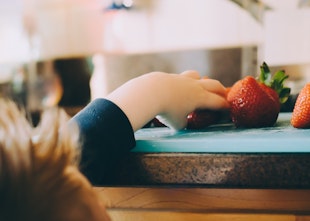Read our brilliant guide for parents
Talking to your child about puberty…
Our kids are exposed to so much information about sex and relationships on TV, in the movies and online that by the time they approach the age of puberty they may already have some advanced ideas of their own.
Our kids are exposed to so much information about sex and relationships on TV, in the movies and online that by the time they approach the age of puberty they may already have some advanced ideas of their own.
However, talking about puberty remains a really important job for parents because not all of the information they have gathered in from a credible source.
It’s best not to wait for your child to come to you with questions about his or her changing body — that day may never come, especially if your they don't know it's okay to chat to you about it. You may have already started talking to your child about the changes our bodies go through as we grow. Since the toddler years, kids have questions and most of your discussions probably come about as the result of your child's questions. It's important to answer these questions about puberty honestly and openly. By the time kids are 8 or 9 years old some girls are wearing training bras by then and some boys' voices begin to change just a few years later.
It’s all about timing
With girls, it's vital that parents talk about menstruation before they actually get their periods. If they are unaware of what's coming, they can be frightened by the sight and location of blood. Most girls get their first period when they're 12 or 13 years old, which is a few years after then they actually begin puberty. However, some girls get their periods as early as age 9 and others get it as late as age 16 so it’s best to be prepared.
On average, boys begin puberty a little later than girls, usually around age 10 or 11. But they may begin to develop sexually or have their first ejaculation without looking older or developing facial hair first. Don’t be deceived by their baby faces.
Many kids receive a little sex education at school which is great. Often, though, they are separated for these talks. It is important that both sides learn about the changes that boys and girls go through so check that these gaps are filled if your school does segregate. It's also not a bad idea to go back over the lessons from school with your child, since kids often still have questions about certain topics and might be too embarrassed to ask in front of their school mates.
What’s best to say
When talking to children about puberty, offer them reassurance that the changes they’ll experience are completely normal. It's understandable for them to feel insecure.
They may even express insecurity about their appearance as they go through puberty, but it can help them to know that we all go through the same things at some stage. Acne, mood changes, growth spurts, and hormonal changes — it's all part of developing into an adult and everyone goes through it, but remember it’s not always at the same pace, so be very understanding.
For girls it can be upsetting if they are the first one in their class to get a training bra, for example. She may feel alone and awkward and may not want to tell any of her friends and may not want to change in public.
With boys, it’s also observable changes include the cracking and then the deepening of their voices, and the growth of some facial hair. And just as with girls, if your lad is an early bloomer, he may feel awkward with his classmates.
Here’s a quick list of what happens in puberty for when the time is right to discuss with your child:
- Girls become more rounded, particularly in the hips and legs.
- Girls' breasts begin to swell and grow, sometimes even one faster than the other
- Girls and boys get pubic hair and underarm hair, and their leg hair becomes thick and dark.
- Both girls and boys often get acne and start to perspire more.
- Both girls and boys have a growth spurt.
- Boys' penises and testicles grow larger.
- Boys' voices change and become deeper.
- Boys grow facial hair.
- Boys sometimes have wet dreams, which means they ejaculate in their sleep.
- A girl's period may last anywhere from 3 days to a week.
Tips
Make the time to talk to them and let your child know that you're available any time to discuss and answer any more questions they have. Remember if you are uncomfortable talking about puberty, your child will likely feel even more uncomfortable. Try to relax and talk as openly as possible. Start by letting them know that while it may be a little uncomfortable to discuss, it's an important talk to have.
Make the time to talk to them and let your child know that you're available any time to discuss and answer any more questions they have. Remember if you are uncomfortable talking about puberty, your child will likely feel even more uncomfortable. Try to relax and talk as openly as possible. Start by letting them know that while it may be a little uncomfortable to discuss, it's an important talk to have.






